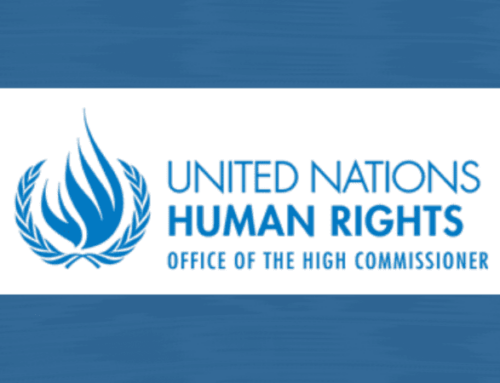Monitoring of criminal proceedings of Valentin Ivanovich Tyapkin (November 27, 2020)

11/27/2020 in the Lutsk City District Court of the Volyn Region with the participation of a panel of judges A.E. Sivchuk, A.M. Pakholyuk, A.D. Artysh a hearing was held in case No. 161/14219/18 on charges of V.I. Tyapkin in the commission of a criminal offense under Part 3 of Article 289 of the Criminal Code of Ukraine – “illegal seizure of a vehicle”.
At the hearing, the accused changed his lawyer to T.P. Gaidamachenko, who will represent his interests on the basis of a legal assistance agreement. In connection with the replacement of the lawyer, T.P. Gaidamachenko objected to further judicial consideration, since she did not have time to get acquainted with the case materials and asked the court to limit the hearing to considering the petition of the prosecution and defense. The court and the prosecutor did not object.
The prosecution filed a motion to extend V.I. Tyapkin’s measures of restraint in the form of detention for a period of 60 days, and indicated that the risks under Article 177 of the Criminal Procedure Code of Ukraine, which were the basis for the application of an exceptional measure of restraint in the form of detention, did not decrease. The prosecutor indicated that V.I. Tyapkin may put pressure on witnesses, there is a high probability of committing new criminal offenses or interfering with the investigation.
Defender of V.I. Tyapkin objected to the satisfaction of the prosecutor’s petition, and stated that the accused would not exert any pressure on the witnesses. In turn, the lawyer T.P. Gaidamachenko petitioned to change the measure of restraint to house arrest, due to the fact that the accused has the opportunity to get a job and provide support for his family, in particular, two minor children. Also, V.I. Tyapkin has a registered place of residence in the city of Kovel and stable social ties.
The accused himself has filed a motion to change the measure of restraint to any form other than detention. He asked to release him completely from charges regarding Part 3 of Article 289 of the Criminal Code of Ukraine.
In addition, in his petition, the accused stated that all reasonable terms of detention had been violated in relation to him, and the court was showing a biased attitude towards him.
After evaluating the petitions, the court ruled to satisfy the prosecution’s petition in full, extending the detention period for 60 days with the possibility of paying a bail in the amount of UAH 352,400. The court argued its position by the fact that the accused was on the wanted list, all witnesses from the defense had not yet been questioned. In addition, the trial is ongoing, and there is a high probability that the defendant will obstruct the consideration of criminal proceedings.
The experts of the ISHR are concerned that the extension of the terms of detention in the case of V.I. Tyapkin may be automatic. According to the monitoring results on July 16, 2020, the observer of the ISHR drew attention to the improper proof of the existence of risks by the prosecution. For the first time by the Lutsk City District Court of the Volyn Region, the term of detention of V.I. Tyapkin was extended on September 10, 2018, which means that the accused has been in custody for more than 2 years waiting for a court decision.
The European Court of Human Rights argues that national courts must first and foremost ensure that, in a particular case, the detention of an accused does not exceed a reasonable time. To this end, they must, taking due account of the principles of the presumption of innocence, examine all the circumstances of the case that may confirm or deny the existence of a public need that justifies deviations from the requirement to respect individual liberty, and indicate this in their decisions to extend the term of detention (“IA v. France”, para. 102).
Having studied all the decisions of the Lutsk City District Court of the Volyn Region on the extension of the term of detention, the ISHR notes that the national court has not changed the rationale for the need to extend the term of detention from the moment of the first decision. Such actions may contradict the practice of the ECtHR.
Thus, the ECtHR points out that the question of whether the length of detention is reasonable cannot be decided in the abstract. It must be decided in each case, taking into account the specific circumstances, grounds and duly documented facts, as well as have an appropriate reasoning. Continued detention can only be justified in a particular case if there are specific indications that it is required by the true demands of the public interest, which, despite the presumption of innocence, outweigh the rule of respect for personal freedom. According to paragraph 3 of Article 5 of the ECHR, after a certain period of time the existence of a reasonable suspicion ceases to be a basis for deprivation of liberty and the judicial authorities are obliged to provide other grounds for continued detention. In addition, such grounds must be clearly indicated by the national courts (“Kharchenko v. Ukraine”, paras. 79-80).
In the case of V.I. Tyapkin the decision of the national court is based on the following facts: V.I. Tyapkin is accused of committing an especially grave crime, was on the wanted list, witnesses were not questioned. Such arguments formed the basis of the first decisions of the national court to extend the period of detention and have remained unchanged for two years. In justifying the need to extend the period of detention, the domestic court limited itself only to one paragraph.
The European Court of Human Rights has often found a violation of paragraph 3 of Article 5 of the Convention in cases where domestic courts continued detention, referring mainly to the gravity of the charges and using formulaic language, without even considering specific facts or the possibility of applying alternative measures (“Kharchenko v. Ukraine”, paras. 80-81; “Tretyakov v. Ukraine”, para. 59).
The existence of a reasonable suspicion that a detained person has committed a crime is a prerequisite for the legality of continued detention, but after the expiration of such a suspicion, in the opinion of the ECtHR, it will not be enough to justify prolonged detention. The European Court of Human Rights has never tried to translate this concept into a clearly defined number of days, weeks, months or years, or at different times depending on the severity of the crime. Once “reasonable suspicion” is no longer sufficient, the national court must establish whether there are other grounds justifying the deprivation of liberty (“Maggie and Others v. The United Kingdom”, paras. 88-89).
According to the decision of the ECtHR in the case “Belevitsky v. Russia” (paras. 111-112), the court must take into account that the restriction of consideration of the application for election (or the extension) of a measure of restraint in the form of detention only by a list of legislative (standard) grounds for its application without establishing their availability and validity to a specific person is a violation of the requirements of paragraph 4 of Article 5 of the Convention.
In addition, the International Society for Human Rights is concerned about the timing of the consideration of case No. 161/14219/18. The indictment was submitted to the court on 09/06/2018. Thus, the case of V.I. Tyapkin has been considered in court for more than 2 years.
Article 6 of the Convention for the Protection of Human Rights and Fundamental Freedoms recognizes for every person prosecuted in a criminal case the right to receive, within a reasonable time, a final decision on the well-foundedness of the charges against him, or rather, the achievement of ensuring that the accused do not remain for a long time under the weight of the charge and that a decision is made on the validity of the charge (“Vemkhov v. Germany”, para. 18, “Julia Manzoni v. Italy”, para. 25, “Brogan and Others v. United Kingdom”, para. 65).
In its judgments, the ECtHR indicates that an accused in criminal proceedings should have the right to have the proceedings in his case carried out with particular care, especially in the case of any restriction of freedom for a period until the end of the proceedings. Article 6 of the ECHR requires courts to use all available procedural means to establish the guilt or innocence of a person without undue delay. This requirement is intended to ensure the earliest elimination of uncertainty about the legal fate of the accused, who remains in a state of uncertainty throughout the entire period of proceedings, despite the fact that the proceedings are ongoing or have been suspended (“Doroshenko v. Ukraine”, para. 41).
The next court session was scheduled for December 22, 2020. The monitoring group of the International Society for Human Rights will continue to monitor this case.






Leave A Comment